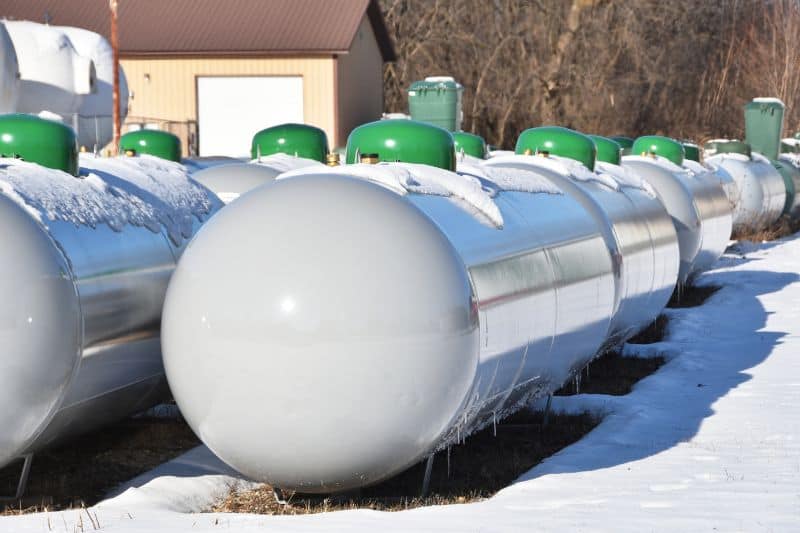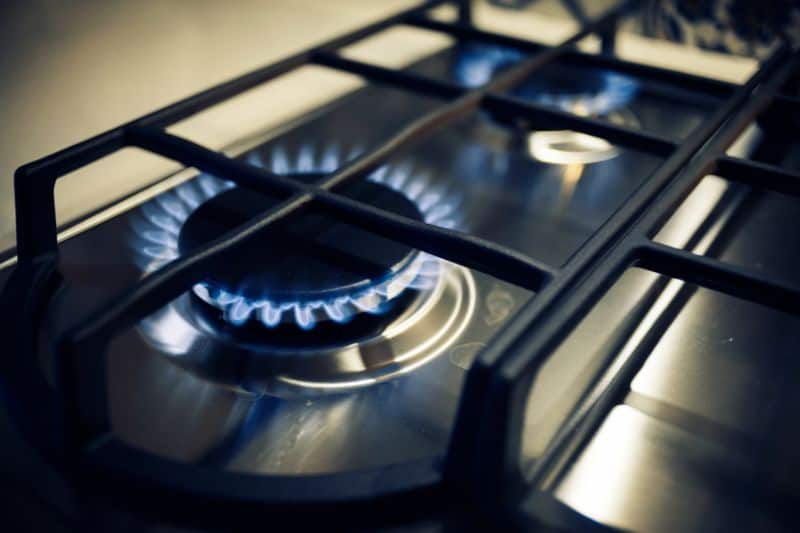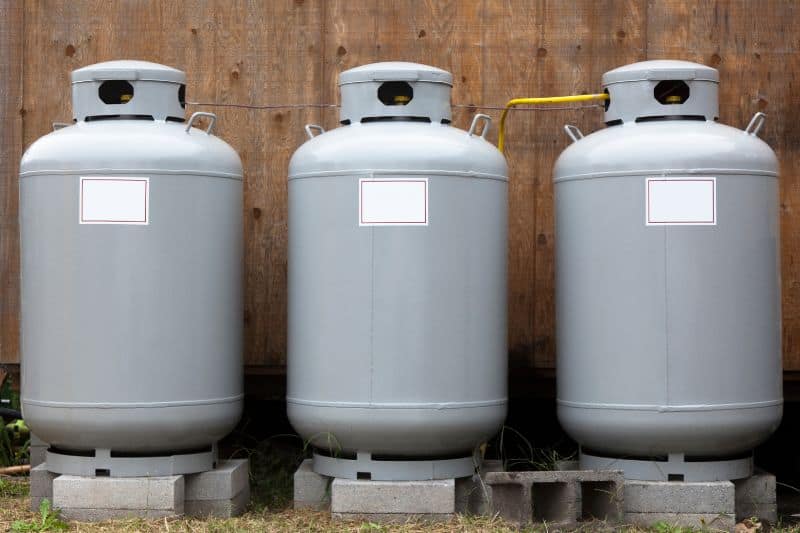Let’s think of a scenario; you just arrived home and are a bit hungry and want a taste of some fresh food. There might be several options, but one of them includes firing up the cooker and cooking a fresh meal. The confidence you have in this option is based on the fact that propane gas will flow and be ignited by the cooker, heating your pan.
Propane or what is mostly known as LPG (liquified petroleum gas) is a gas that is mostly preferred as a source of fuel and is a by-product of natural gas. It is known to be safe, clean, powerful and reliable, powering many homes and businesses all over the world.
There is a lot that is known about gas, although at the same time, a lot is unknown. This article dissects propane gas, explains what it is and its advantages and disadvantages.

What is Propane?
Propane is a gas that is often compressed and stored in its liquid form, hence the term liquified petroleum gas (LPG). It is non-toxic, colorless, and virtually odorless, although an identifying odor is added so it can be detected.
Propane is safe, clean, powerful and reliable, making it ideal for powering homes and businesses all over the world. It is an alternative fuel that is a by-product of natural gas processing and petroleum refining.
Propane is commonly used for space and water heating, cooking, and as fuel for engine applications such as forklifts, farm irrigation engines, fleet vehicles, and buses; however, its applications are rapidly growing due to new technology developments. When used as vehicle fuel, propane is known as propane Autogas.
Propane is a fossil fuel and is ‘found’ naturally, alongside natural gas and oil, and is therefore not ‘made’. It is separated from natural gas during processing, often using refrigeration and therefore, contrary to popular belief, propane is not made from natural gas but is extracted from it.
The gas can also be extracted from heated crude oil using a distillation tower. Once the propane is isolated, it is pressurized so it can be stored as a liquid in the cylinders and tanks you see in cages at retail locations nationwide.
Although propane gas is associated with crude oil and other products or processes that damage the environment, the gas is environmentally friendly and is not a greenhouse gas.
In fact, in the Clean Air Act of 1990, the US Congress named LPG as one of the clean-burning alternative fuels designated to take national air quality into the twenty-first century.
Is Propane More Flammable Than Natural Gas?
Yes, propane is more flammable than natural gas although comparing their flammability might be moot. What would be more important to note is which one of the two is the better option.
The issue of flammability goes back to the chemical composition of the two. Natural gas or methane (CH4) has one carbon and four hydrogen atoms.
Propane (C3H8), on the other hand, has three carbon and eight hydrogen atoms. The more hydrogen atoms there are, the hotter it burns.
The flammability of the two will also be guided by the temperature and pressure they are exposed to. Before propane is ignited, it has to boil into its gaseous state from the stored liquid state.
The liquid propane cannot burn but when it converts to a gas, which takes a fraction of a second, it will burn immediately. Propane is also heavier than air and will therefore sink and spread across low levels while methane, being lighter than air, will tend to rise into the atmosphere.
Various Advantages of Propane
Some of the common advantages of using propane include:

1. It Is Clean
In a world where everyone needs to be cautious of what they do or use because of their effects on the environment, it is increasingly beneficial to confirm is propane is a clean source of energy.
Indeed, propane is clean and is an approved source of fuel, listed by the 1990 Clean Air Act in the US. As such, substituting propane for other fuels such as gasoline and fuel oil is an economical and viable step toward cleaner air.
Propane is not associated with carbon mono- or dioxide gases or other nitrogen oxides which are harmful to the environment and using it reduces the greenhouse gas carbon dioxide and air pollutants. The gas is also non-toxic and emits less than half the greenhouse gases that electricity does.
2. It Is Environmentally Friendly
Propane is a low-carbon fuel, burns cleaner, and powers more efficiently in comparison to natural gas, diesel, electricity and fuel oil.
Also, since propane does not spill, pool, or leave a residue, tank leaks cannot contaminate water or soil, and will not cause damage to your home or family.
When compared with electric, propane appliances can dramatically reduce energy costs and environmental impact.
Plus, propane is also insoluble in water and cannot in any way contaminate your water, soil or neighboring aquifers like liquid fuels.
Even if it leaks, propane dissipates quickly into the atmosphere and a small amount of air movement is enough to disperse the vapor. This becomes important when operating in environmentally sensitive areas such as farms, nature reserves or by water.
3. It Is Affordable
Even if the price of propane is complex and fluctuates alongside other commodities and with season demands, you can always be sure that the price of propane will always be generally lower than other sources of energy.
Propane is a by-product of domestic natural gas processing and sometimes crude oil refining, whose price continues to fall, meaning the price of propane will fall as well.
Compared to conventional fuels and other alternative energy sources, propane generally costs less, even as fuel prices fluctuate.
4. Propane Is Versatile
Propane is versatile enough to power a home’s furnace, water heater, stove, clothes dryer, fireplaces, standby power, and outdoor amenities like barbecue grilling, lighting, and pool, patio and spa heating.
It also makes outdoor adventures complete as it will be used for heating, cooking and powering insect traps on your camping, tailgating or RV adventures.
Its performance cannot be matched by any other source of fuel. Propane is also used as vehicle fuel, known as Autogas, in the internal combustion engines of vehicles. Autogas is a ‘green’ source of fuel as it reduces the exhaust mission of carbon dioxide by about 15% compared to petrol.
5. It Is Reliable
Propane fits what the contemporary home buyer wants in a home, safe, reliable and efficient sources of fuel, all without breaking the household’s budget.
Propane’s performance cannot be matched by any other fuel sources, in addition to the fact that it delivers low emissions and low energy bills, all the while providing premium performance.
This is why homebuyers are willing to pay a premium for an all-propane home compared with an all-electric model.
Propane also gives you the flexibility to add gas performance anywhere natural gas is not an option. It is also reliable given that it can easily be availed in rural areas, where natural gas is not available.
6. It Is Abundant
The US is the world’s leading propane producer, and the nation produces more than enough propane to meet the demands.
Propane is an abundant “bridge fuel,” making it a clean-burning alternative to gasoline and diesel that can address energy challenges while long-term renewable technologies are developed.

7. Propane Creates Jobs
After the gas leaves the processing plant and is stored in tanks in its liquid form, it has to be distributed all over the world. In the States alone, this is an opportunity that creates about 80,000 American jobs.
This is because propane has to travel through a network of pipelines, railroad tank cars, tractor-trailers, and barges.
From regional storage sites nationwide, the propane is then sent to distributors, like your supplier. It is then pumped into bobtail delivery trucks that deliver it to millions of American homes and businesses.
8. It Is Safe
Propane has enjoyed a strong safety record, due in large part to the stringent codes and regulations developed by the propane industry and the National Fire Protection Association (NFPA). Statistics compiled by the NFPA indicate that the safest way to heat is with gas.
But as with any energy source, there are steps you should take to further ensure your safety. Propane is still flammable and can cause real harm and damage if accidentally ignited and therefore, make sure you take precautions when using it, like ensuring there are no leaks in the pipes or your appliances.
If all is safe from your end, propane will serve you safely and you will not have to worry about others using it while you are not home.
9. It Is Convenient to Use and Store
As already mentioned, propane is stored in tanks that can be delivered right to your doorstep. The tanks are environmentally friendly, require little maintenance, and can last up to 40 years.
The fact that the gas can be stored and transported in its liquid form, makes it a convenient fuel for home, industrial and outdoor use.
According to Petro, there are up to 56,000 miles of pipeline and more than 6,000 retail dealer locations that make propane readily available throughout the United States
Various Disadvantages of Propane
Despite all the benefits of propane, this type of fuel comes with it’s fair share of drawbacks.
Here are some cons of propane:
1. It Can Cause Health Problems
Propane comes with a downside especially the risk of propane poisoning, a condition similar to frostbite. If you happen to inhale or swallow propane, you can die from propane poisoning.
The results can also be disastrous if you inhale too much propane and then happen to ignite a fire immediately after. You also run the risk of carbon monoxide poisoning when you combust propane under suboptimal conditions.
The propane will not combust completely, and your furnace will release carbon monoxide which is not only a greenhouse gas but is also dangerous for human health.

2. Logistical Problems
Most propane requires delivery to homes so that it is then piped to the home. This means you not only have to wait for a truck to make the delivery and fill your propane tank, but you also have to store it safely.
This becomes a bit complicated especially if you are living in a tiny house. The delivery might also be a problem, especially in the cold winter months when the roads are dangerous and might be blocked, leaving you stranded.
3. Safety Concerns
The other issue with propane is safety. Propane burns quite easily, making it an ideal fuel but also an easily combustible fuel. If you leak, it can build up. In an enclosed situation, an ignition will result in a catastrophic explosion.
The propane is stored in liquid form in tanks under high pressure and if you dent or rupture a tank, it will definitely explode. This will become all the more dangerous if it explodes and there is a source of fire or ignition close to the escaping gas, which will result in a huge fire.
You should therefore store your tanks safely and ensure they are tightly piped, to avoid leaks, poisonings and potential fires that can destroy everything around you.






